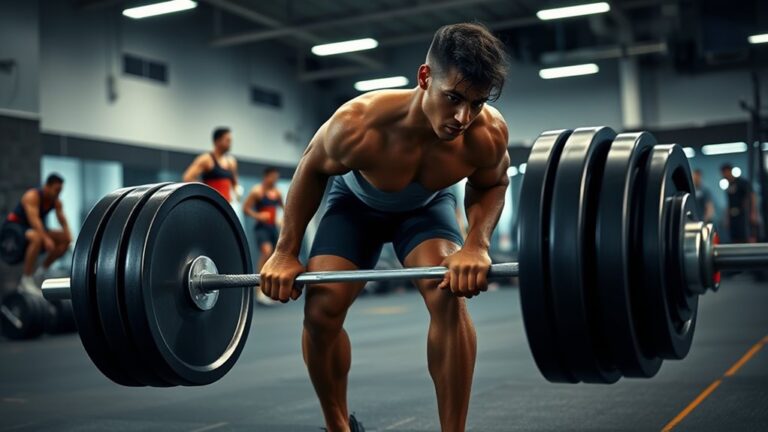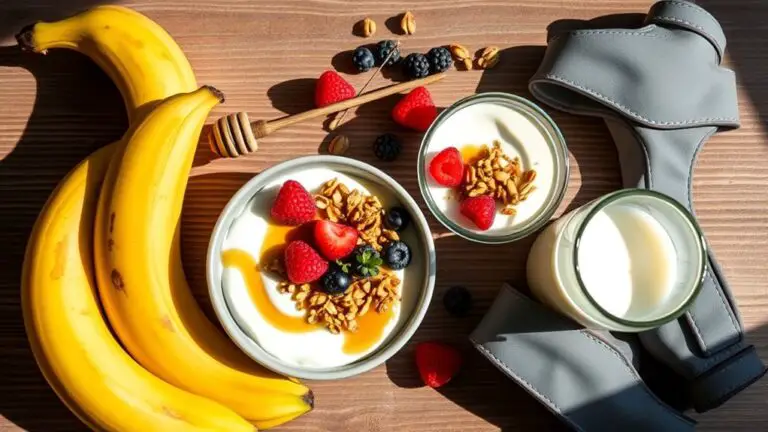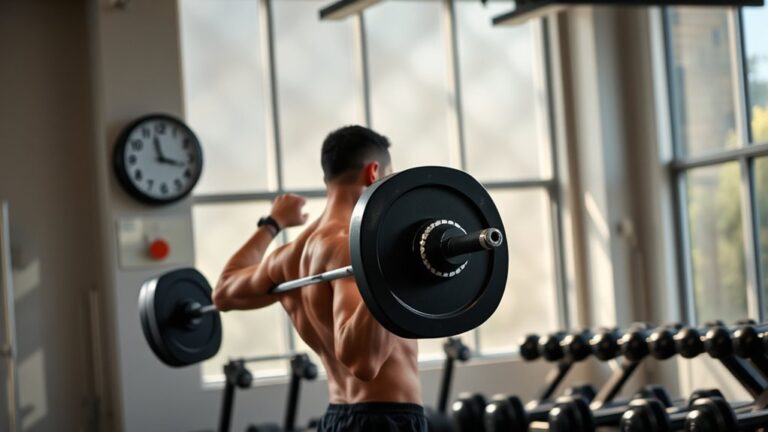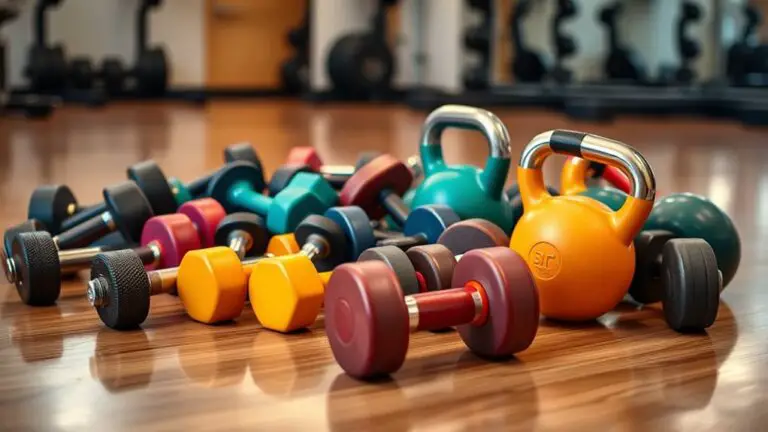How Muay Thai Fighters Train for Strength and Conditioning
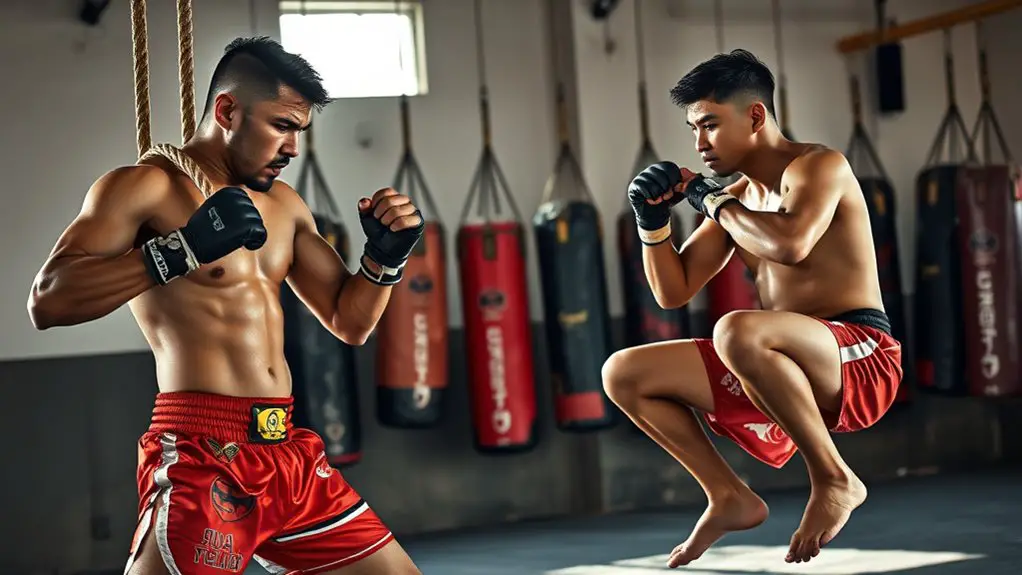
Muay Thai fighters prioritize strength and conditioning to enhance performance and prevent injuries. They’ll focus on core training to build stability and power for strikes. Cardiovascular endurance is key for lasting energy throughout intense rounds, often achieved through interval training. Functional strength training mimics ring movements, improving coordination and agility. Additionally, recovery techniques and proper nutrition play crucial roles in muscle repair and performance. Explore further to discover how specific training approaches can transform your fighting skills.
Understanding the Importance of Strength and Conditioning in Muay Thai
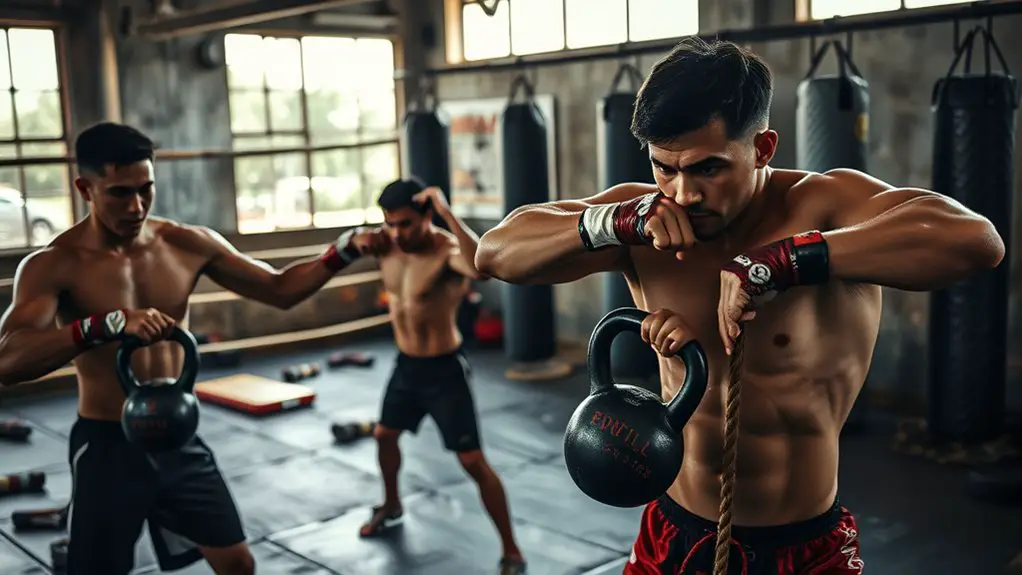
While many might focus solely on techniques and sparring when training in Muay Thai, understanding the importance of strength and conditioning is essential for any fighter aiming to excel. Strength benefits aren’t just about power in strikes; they enhance your resilience and injury prevention. By incorporating specific conditioning techniques, you can improve your stamina, allowing you to maintain a high pace throughout rounds. Skipping rope, which can be both aerobic and anaerobic, is an excellent addition to your training routine for enhancing cardiovascular fitness. Focusing on compound movements like squats and deadlifts builds overall strength, while plyometrics can increase explosiveness. Engaging in circuit training not only boosts your cardiovascular endurance but also simulates fight conditions. Don’t underestimate the role of flexibility and mobility work, as they contribute to better movement and reduce the risk of injuries. By integrating these elements into your routine, you’ll find that your performance in the ring improves, giving you the competitive edge needed to stand out in the demanding sport of Muay Thai.
Core Training: The Foundation of Power and Stability
Core training is often overlooked, yet it serves as the bedrock of both power and stability in Muay Thai. Your core stability directly influences your ability to generate force and maintain balance during strikes and evasive maneuvers. By incorporating targeted core exercises into your routine, you’ll not only enhance your performance but also reduce the risk of injury.
Focus on a mix of dynamic and static movements, such as planks, Russian twists, and medicine ball throws. These exercises engage multiple muscle groups, ensuring that your core functions as a cohesive unit. Strong core stability allows you to transfer power from your lower body to your upper body, making every punch and kick more effective.
Cardiovascular Endurance: Key to Lasting Through Rounds
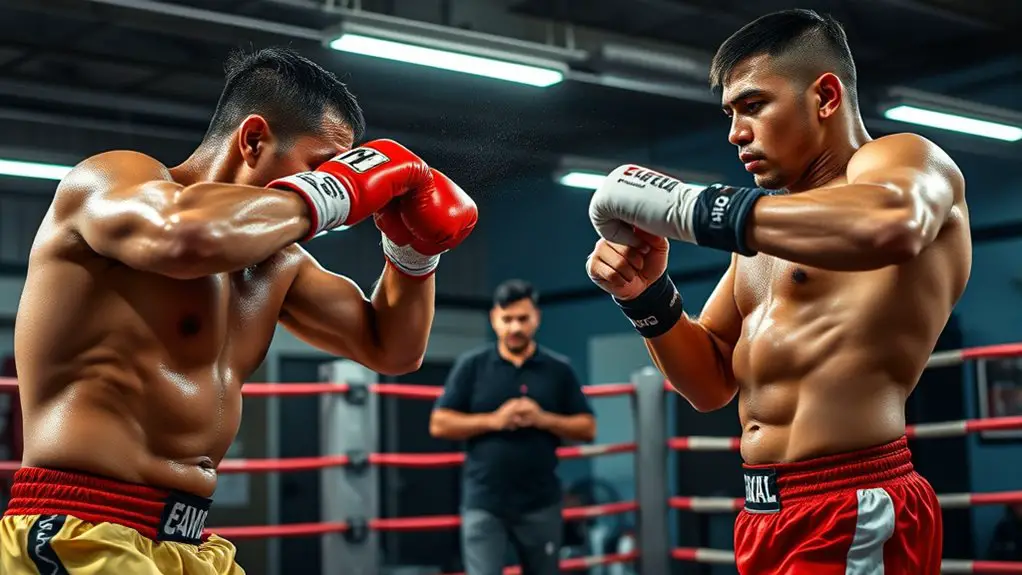
To excel in Muay Thai, you need more than just skill and technique; you must also build cardiovascular endurance. This endurance is essential for maintaining your energy levels throughout intense rounds and ensuring you can deliver your best performance. One effective method to enhance your aerobic capacity is through interval training. By alternating between high-intensity bursts and lower-intensity recovery periods, you can push your heart rate and improve your overall stamina.
Incorporating interval training into your routine not only boosts your cardiovascular fitness but also conditions your body to sustain prolonged activity, which is important in a sport where every second counts. As you progress, you’ll notice that your ability to recover between strikes and maintain power during the later rounds will improve markedly. Embrace this training method, and you’ll find yourself lasting longer and fighting stronger in the ring.
Functional Strength Training: Building Power for Strikes
As you explore Muay Thai training, you’ll quickly realize that building functional strength is crucial for delivering powerful strikes. Unlike traditional weightlifting, functional strength training focuses on movements that mimic the dynamic actions in the ring. Exercises like kettlebell swings, medicine ball throws, and plyometric jumps help develop the explosive power you need to enhance your strikes.
Incorporating compound movements targets multiple muscle groups, improving coordination and stability. This not only boosts your striking power but also prepares your body for the demands of a fight.
Don’t underestimate the importance of core training, as a strong core is essential for transferring energy through your body during strikes. Aim for a balanced routine that emphasizes strength, agility, and endurance. Remember, it’s about training the body to perform effectively in real scenarios, ensuring every punch and kick packs a powerful punch while maintaining functional movement.
Recovery and Nutrition: Essential Components of a Fighter’s Regimen

While training hard is crucial, neglecting recovery and nutrition can undermine your progress as a Muay Thai fighter. Recovery techniques like foam rolling, stretching, and adequate sleep are fundamental to repair muscle damage and prevent injury. Your body needs time to recuperate, and without proper recovery, you risk burnout and diminishing returns on your training.
Nutrition timing plays an important role in optimizing your performance. Consuming the right nutrients before and after workouts ensures your muscles are fueled and ready for action. Aim for a balanced intake of carbohydrates, proteins, and healthy fats, focusing on immediate post-training meals to replenish glycogen stores and aid muscle repair.
Incorporating these elements into your regimen not only enhances your performance but also supports longevity in the sport. Remember, it’s not just about how hard you train; it’s about how well you recover and nourish your body.
Frequently Asked Questions
How Often Should Muay Thai Fighters Change Their Training Routines?
You should consider changing your training routine every 4 to 6 weeks for ideal progress. This routine variation keeps your workouts fresh and challenging, preventing plateaus. Incorporating different training frequencies can enhance your strength, endurance, and skill sets. By mixing in new techniques or conditioning exercises, you’ll not only stay motivated but also adapt more effectively. Remember, consistency is key, but so is the ability to evolve your routines for continuous improvement.
What Role Does Mental Conditioning Play in a Fighter’s Training?
Picture a samurai, calm and focused, ready for battle. Mental conditioning’s essential in your training, as it fosters mental resilience, allowing you to push through challenges. By utilizing visualization techniques, you’re not just imagining victory; you’re training your mind to anticipate and react effectively under pressure. This mental fortitude complements your physical prowess, ensuring you’re not just a fighter, but a strategic warrior prepared for any fight that comes your way.
Are There Specific Supplements Recommended for Muay Thai Fighters?
If you’re considering supplements as a Muay Thai fighter, protein timing’s essential for muscle recovery and growth. Consuming protein post-workout can optimize your gains. Recovery supplements like BCAAs or glutamine may also help reduce muscle soreness and enhance your performance. However, it’s important to consult a nutritionist to tailor your supplementation to your training regimen. Proper nutrition complements your hard work, ensuring you’re at your best when it counts.
How Do Injuries Affect a Fighter’s Strength and Conditioning Regimen?
Injuries can greatly impact your strength and conditioning regimen. During injury recovery, it’s vital to incorporate rehabilitation techniques that focus on restoring mobility and strength without aggravating the injury. You might need to adjust your training intensity and volume, prioritizing functional movements that promote healing. Staying motivated through this process is essential; remember, every step you take towards recovery builds a stronger foundation for your future performance. Adapt, learn, and come back even stronger.
What Are Common Misconceptions About Strength Training in Muay Thai?
Strength training in Muay Thai often faces myth debunking, much like a phoenix rising from the ashes of misunderstanding. Many believe lifting heavy weights will slow you down, but in reality, it enhances your explosive power and endurance. You shouldn’t shy away from strength training; it’s not just for bodybuilders. Instead, embrace the strength benefits it offers, integrating it into your regimen to sharpen both your technique and overall performance in the ring.

